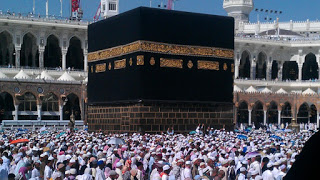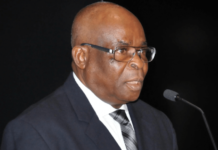Hajj is a spiritual journey of the highest order for the pilgrim. It is a very herculean and dangerous endeavour on one hand and a very rewarding venture on the other hand for the managers and operators. Any Hajj manager who assists a pilgrim to attain Hajj mabrur – accepted Hajj by Allah – is rewarded with the same as the pilgrim. This means that a Hajj manager can get as much reward as the number of pilgrims he assists to attain accepted Hajj. On the other hand, any Hajj manager who cheats a pilgrim or misdirects the pilgrim not to attain Hajj mabrur, after spending such huge human and capital resources, will receive the punishment of his act. That is why transparency is required for human assurances, though Allah knows all that man conceives in the heart or does physically. All over the world, even in developed countries, there have been cases of shortcomings in Hajj from pilgrims themselves and their handlers on the other side.

(adsbygoogle = window.adsbygoogle || []).push({});
The National Hajj Commission of Nigeria (NAHCON), is the national body instituted by the Government of Nigeria to oversee all affairs relating to Hajj and Umrah in Nigeria. NAHCON is the only Nigeria’s authority which regulates all Nigerian operators of Hajj and Umrah. At the state level, the operators are known. They are 38 in number: the 36 states of the federation which have Muslim Pilgrims’ Welfare Boards or Agencies or Commissions, depending on the nomenclature given to it by their respective state houses of assembly. In addition to the 36 entities, the FCT Board and the Armed Forces also have their statuses.
But for the private operators in Hajj and Umrah, the numbers differ every year. The Commission is in charge of licensing all these categories of operators. In the past, only the tour operators were licensed. But in the last three years, the state boards have also been licensed. The policy of licensing state boards has tremendously improved their performances because awards are given to states every year, according to some yardsticks laid down by the commission. In addition, strong appreciation letters and recommendations are written to their governments as recognition for performance and for improvement in subsequent Hajj operations. The states are, like the private operators, graded from A to E. It has sparked competition amongst them as they struggle to upgrade their status, thus improve on transparency and performance. The number of tour operators licensed by NAHCON for 2018 Hajj stands at 117.
There are many components that make up Hajj operations. Almost all the components are made up of services paid for by the pilgrims and provided for them in Nigeria and Saudi Arabia. The innocent intending pilgrim plans, maybe suffers to save the much he/she needs and pays for the Hajj to the Hajj administrator of choice. To the pilgrim, that is the main requirement. He is not there to negotiate for all the services he deserves to enjoy throughout his journey. He may not even know exactly how much he paid for each service and who the service providers are. All he is sure of is that he has paid for all the services.
(adsbygoogle = window.adsbygoogle || []).push({});
The services paid for are air and land transports. The air transport providers charge for the double ways. The processes of securing good air transport for the pilgrim, tough as it may be due to competitiveness in the aviation industry, is not of concern to him. For land transport, the pilgrim pays for that, maybe from the Hajj camps/departure centers to the airports in Nigeria, from the arrival points in Jeddah or Madinah to the pilgrim’s accommodation, from his accommodation in Madinah to Makkah or vice versa, from his accommodation in Makkah to the Holy sites of Mina, Arafah, Muzdalifah and back to Makkah, and from Makkah to departure point of Jeddah.
The pilgrim pays for his accommodation in Makkah, Madinah and the Holy sites. He pays for his feeding throughout his stay as a pilgrim in Saudi Arabia. He pays for provision of the Holy Zamzam water in his accommodation in Makkah and Madinah. He pays for the uniform and unified suitcase provided for personal effects and minor gifts from the Holy Land. The pilgrim’s hand luggage is 8kg and the check-in baggage is 32kg. He also pays for the services to be provided for him by the Nigerian and Saudi Arabian airport authorities. The pilgrim pays for every service. But it is not possible for him to directly contact the services providers for negotiation on the price. NAHCON, the State Boards and the Nigerian Diplomatic Corps in Saudi Arabia do all the negotiations in the Kingdon, while other government agencies collaborate with NAHCON to negotiate prices of services in Nigeria. All are done on behalf of the intending pilgrim. Here comes the dire need for transparency, accountability and above all the fear of Allah.
No doubt, the past history of Hajj in Nigeria was full of controversies in service provision for pilgrims. The pilgrim would pay but would not be sure of going for the Hajj or getting the services paid for or even recovering the funds for services not rendered at all or unsatisfactorily rendered. The service providers, who are supposed to be servants to the pilgrims, were kings. No one controlled them or monitored their corresponding activities for the pilgrims. The bywords that the customer is the king and always right or that “who pays the piper dictates the tune” was not applicable. The service providers in the Kingdom were even more terrible in dealing with Nigerian pilgrims because they felt sure that nothing could happen to them amidst the shortchanging of pilgrims. NAHCON has dragged service providers to court in Saudi Arabia and in Nigeria on breaches of contracts. The commission has won cases in this regard.
(adsbygoogle = window.adsbygoogle || []).push({});
In the simple term, corruption marred Hajj operations in the past. But since NAHCON came into being, things are changing. The first task given by President Buhari to the current leadership of the commission led by Bar. Abdullahi Mukhtar Muhammad was to fight corruption in Hajj. NAHCON has, to a very large extent, succeeded in this regard. There is transparency in all the negotiation procedures for services pilgrims pay for. NAHCON, as the regulator and facilitator, merely collects Hajj funds from the state boards and tour operators for onward transfer to services providers. The pilgrims, therefore, do not have direct dealings with NAHCON. But they have the assurances now that whatever they pay for is what they receive corresponding services.
Summarily, NAHCON ensures that pilgrims get value for the money they pay. The commission engages the services providers in open marathon negotiation processes which have continued to yield positive results since the birth of NAHCON which has set up check and balances for the providers to perform or return the money back to the pilgrims. If not for the variation in the official exchange rate of the US dollar to Naira, the Hajj fares would have comparatively been steady with very minimal differences from year to year. For instance, the air fares charged by carriers have always been challenged and negotiated downward by the commission. The local charges and all services provided in Nigeria are subjected to serious negotiations. Except for the services that are not negotiable in Saudi Arabia, the cost of pilgrims’ accommodation in Makkah and Madinah which have significant weight on the overall Hajj fares every year have drastically come down due to the policy initiated and finally implemented by NAHCON since few years now. The policy is basically the direct dealings with the service owners and the elimination of the chains of agents who, in the past, lived on heavy commissions originally sourced from the money paid by the intending pilgrims.
To enhance transparency in Hajj affairs, NAHCON has gone into partnerships with different government and non-government agencies. The media is surely a veritable tool for transparency. The commission is in partnership with the Nigerian Television Authority (NTA), the Federal Radio Corporation of Nigeria (FRCN) and the Voice of Nigeria (VON) to transmit its activities to the public. This is apart from the accreditation of almost all the print and electronic media organizations for coverage of the commission’s activities in Nigeria. The commission now accredits journalists that cover Hajj in Saudi Arabia in order to ‘sanitize’ reporting.
(adsbygoogle = window.adsbygoogle || []).push({});
NAHCON monitors pilgrims’ acquisition of e-passport, visa processing and acquisition, processing and acquisition of Basic Travel Allowances (BTA), provision of appropriate accommodation, proper feeding and payment for Hadaya fee – the sacrificial animal Hajj rite which NAHCON has appointed Jaiz Bank to do for the pilgrims who pay. The commission also insists on electronic Hajj (E-Hajj) registration system. This is to ensure transparency, fair play, justice and equity in the entire Hajj operations. Chairman of NAHCON, while recently addressing ICT officials of the State Boards/Commissions/Agencies in Abuja on 2018 Hajj, warned that all official dealings on Hajj within and outside Nigeria will be in compliance with the system. According to him, all Hajj and Umrah operators are gradually becoming paperless, thus transactions with the State Boards will be based only on the information made available on NAHCON’s e-portal.
(adsbygoogle = window.adsbygoogle || []).push({});
The registration of 2018 Hajj intending pilgrims is done through the E-Hajj registration to guarantee visa processing/acquisition for pilgrims, accommodation, catering services and their transportation. All are done online. The Director of ICT in NAHCON, Dr. Ashiru Sani Daura asked the participants to work diligently on the development on Saudi Arabian Hajj portal, most especially on the issues of guarantors, Mahram, the National Identification Number (NIN) and medical records, among others. He said that NAHCON’s e-portal was easy to access for every intending pilgrim’s data but however cautioned against tempering with already posted information, especially as it relates to repeat-goers, because they would be detected on arriving at the Saudi Arabian entry points.
NAHCON is also in partnership with NAPTIP and office of the Presidency on Diaspora to curtail abscondment during Hajj. The EFCC and ICPC are involved in ensuring that the funds recovered by NAHCON from service providers and returned to pilgrims for services not rendered are actually returned to the beneficiaries. The National Ulama team on Hajj, Muslim Media Practitioners of Nigeria (MMPN), the Mai Hajj and Independent Hajj Reporters, to mention a few, are all partners in progress with NAHCON to ensure transparency in Hajj operations.
Muhammad Ajah is an advocate of humanity, peace and good governance in Abuja. E-mail mobahawwah@yahoo.co.uk.











